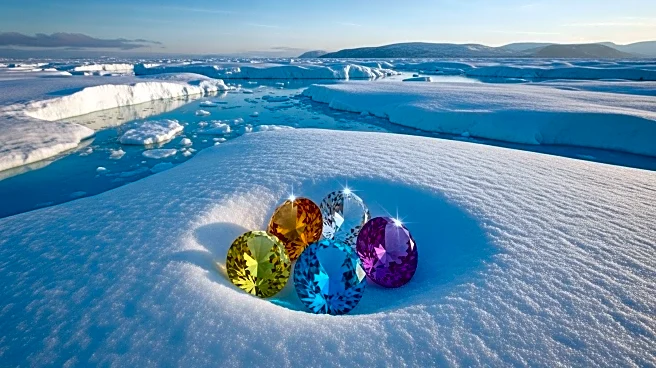What is the story about?
What's Happening?
The Trump administration is exploring the possibility of acquiring a stake in Critical Metals Corp., which is developing the Tanbreez rare earth project in Greenland. This move is part of a broader strategy to secure critical minerals for the U.S. market. The Tanbreez deposit is estimated to contain at least 45 million tonnes of resources, with a significant portion classified as 'heavy' rare earths, essential for applications in clean energy and defense. The project has a net present value of approximately $3 billion and an internal rate of return of 180%, according to a preliminary economic assessment. The phased growth strategy aims to start production by 2026, with plans to expand output significantly. The U.S. government has previously acquired stakes in other companies involved in critical minerals, such as Lithium Americas and MP Materials.
Why It's Important?
Securing a stake in the Tanbreez project is crucial for the U.S. as it seeks to reduce dependency on foreign sources for critical minerals, which are vital for various industries, including technology and defense. The acquisition aligns with national interests to bolster domestic supply chains and enhance economic security. Greenland's vast resources have long been of interest to the U.S., and this move could strengthen geopolitical ties while addressing strategic vulnerabilities. The involvement of the U.S. government in such projects underscores the importance of rare earths in maintaining technological and military superiority.
What's Next?
If the U.S. proceeds with acquiring a stake in the Tanbreez project, it will likely lead to increased investment in Greenland's mining sector, potentially overcoming existing bureaucratic and environmental challenges. The development of processing facilities within the U.S. could further enhance domestic capabilities. Stakeholders, including environmental groups and local governments, may react to the increased mining activity, influencing regulatory and operational decisions. The success of this initiative could pave the way for similar investments in other regions rich in critical minerals.
Beyond the Headlines
The strategic interest in Greenland's resources highlights broader geopolitical dynamics, as countries vie for control over essential materials. Ethical considerations regarding environmental impact and indigenous rights may arise, necessitating careful management to balance economic benefits with social responsibilities. Long-term, this could lead to shifts in global supply chains and influence international relations, particularly with countries that currently dominate the rare earth market.
















